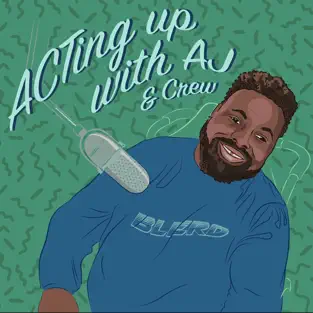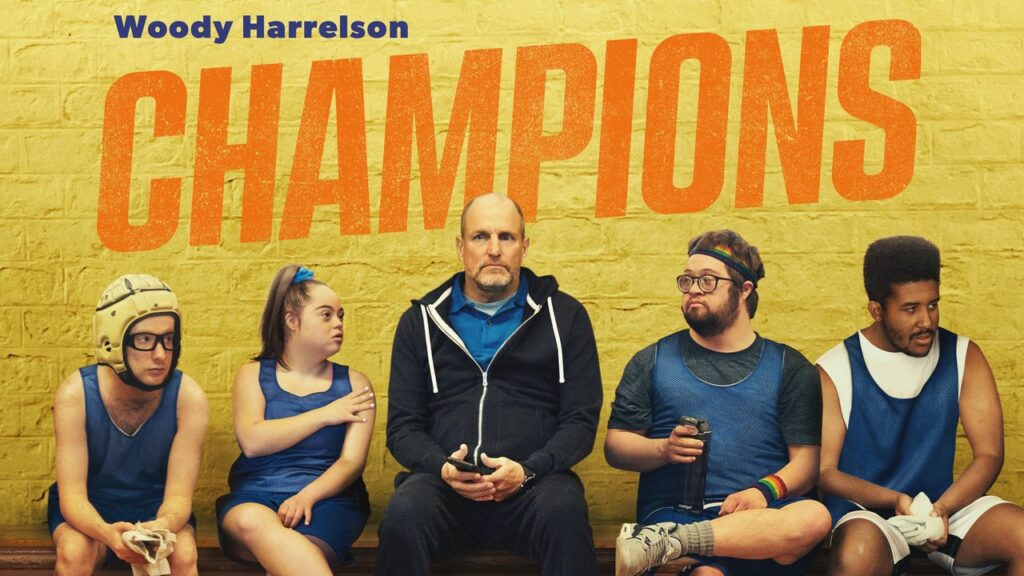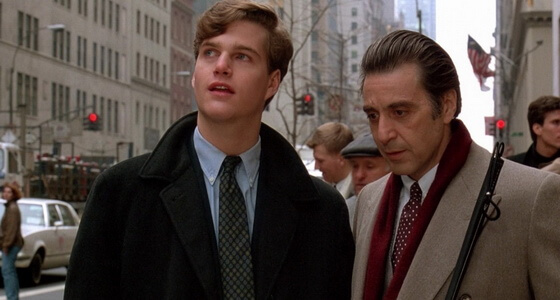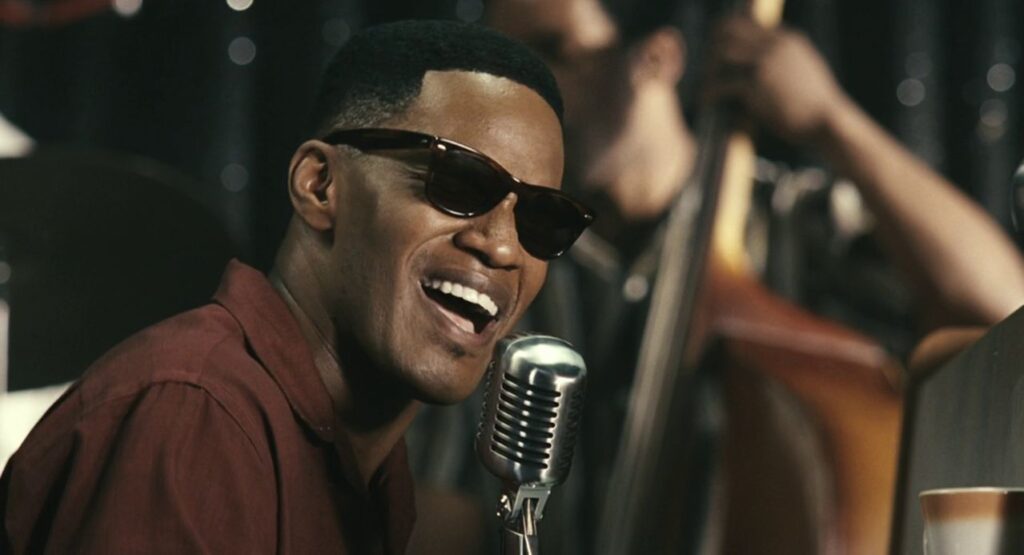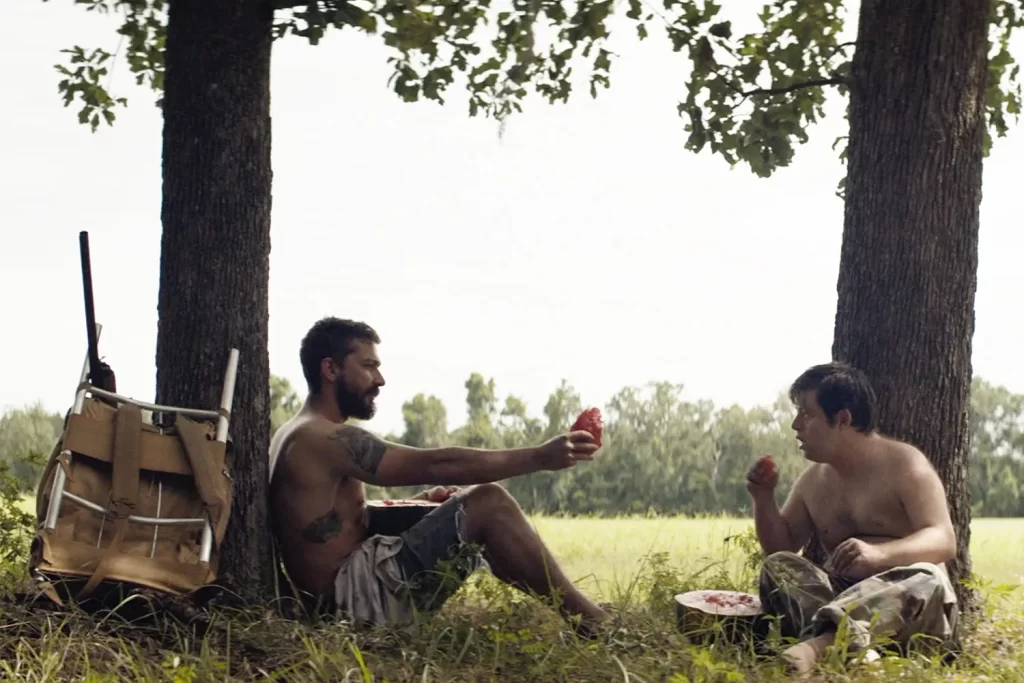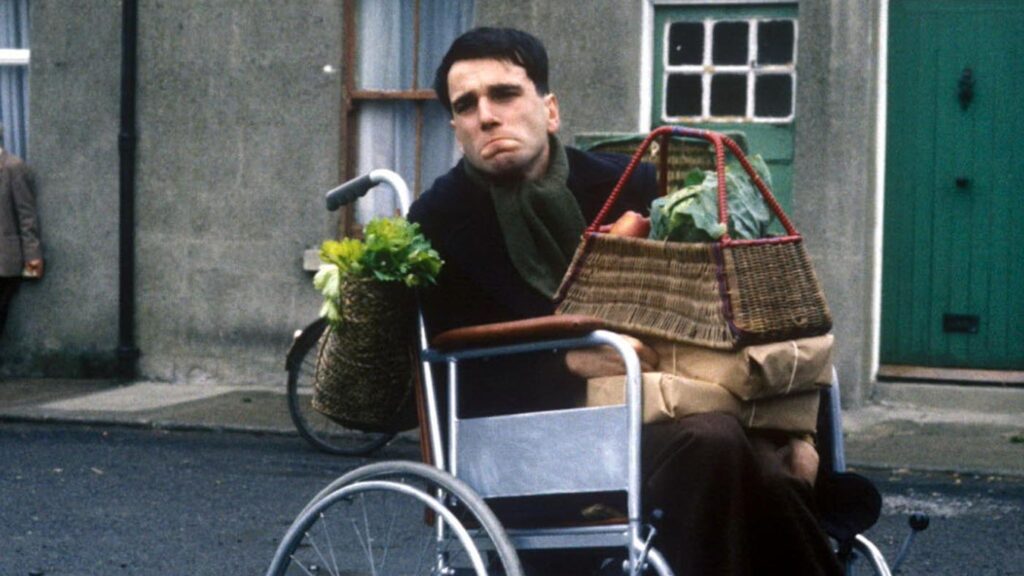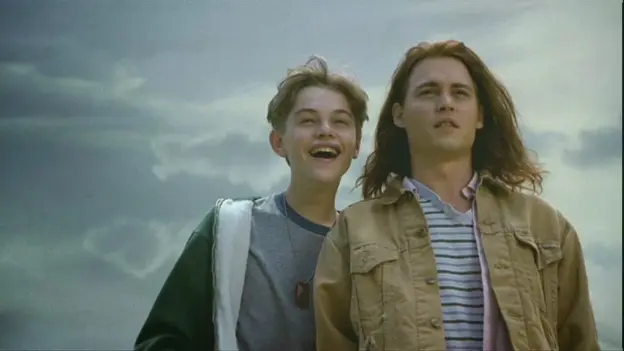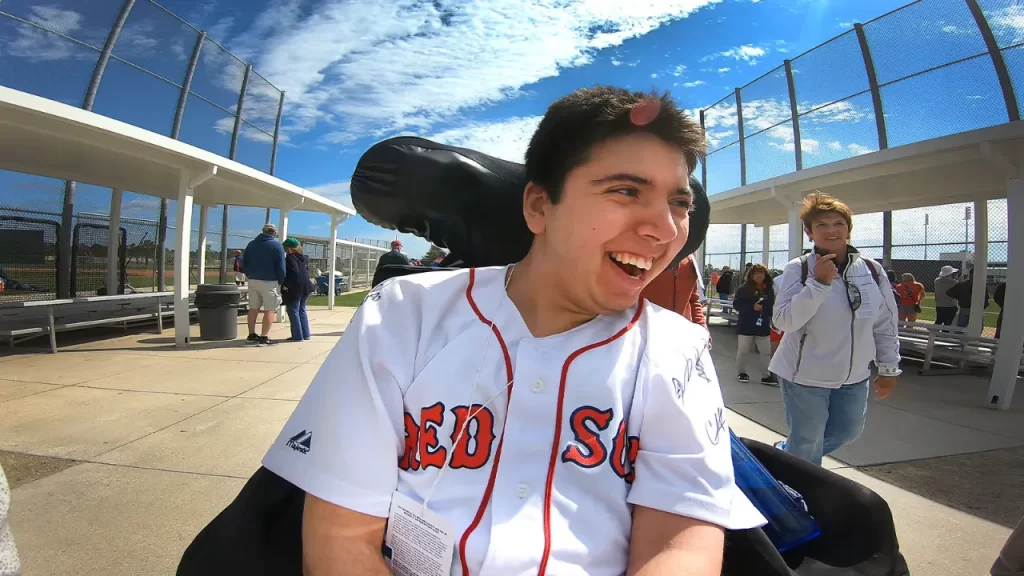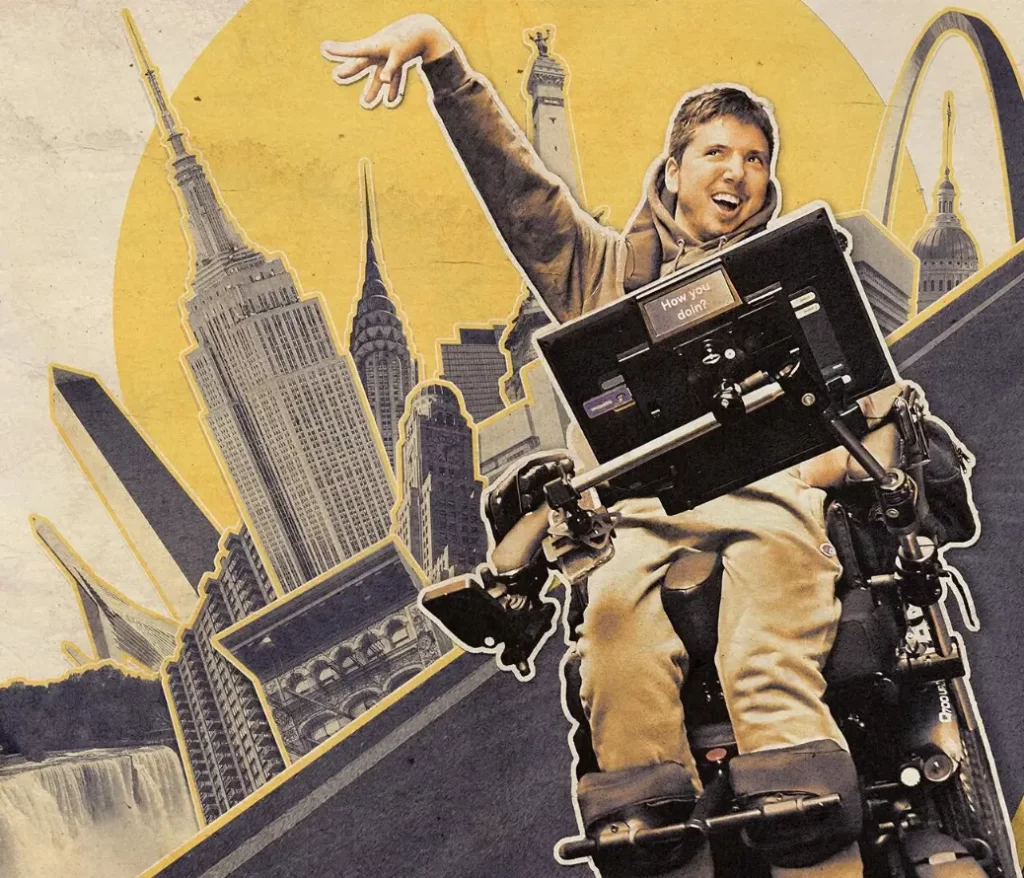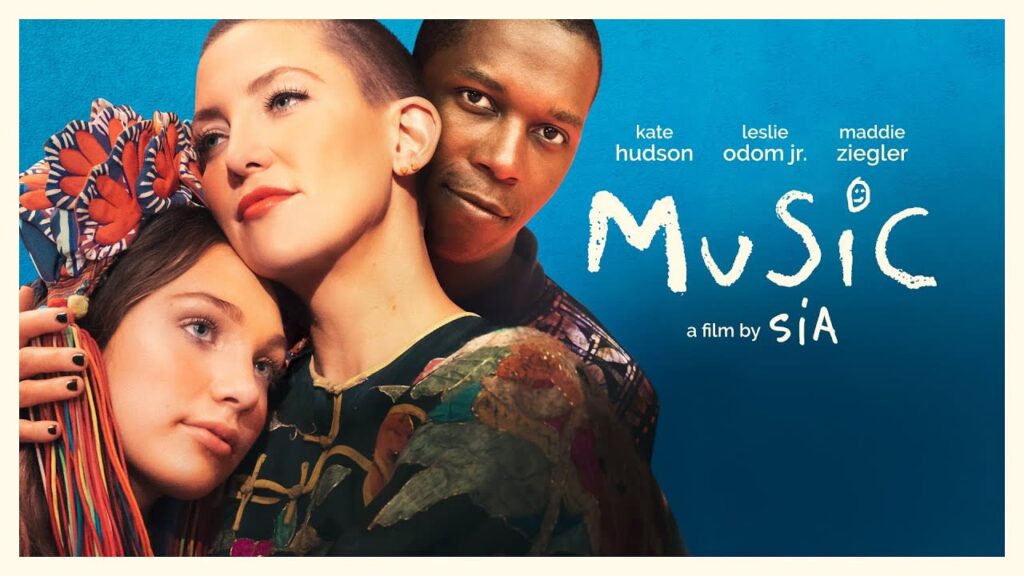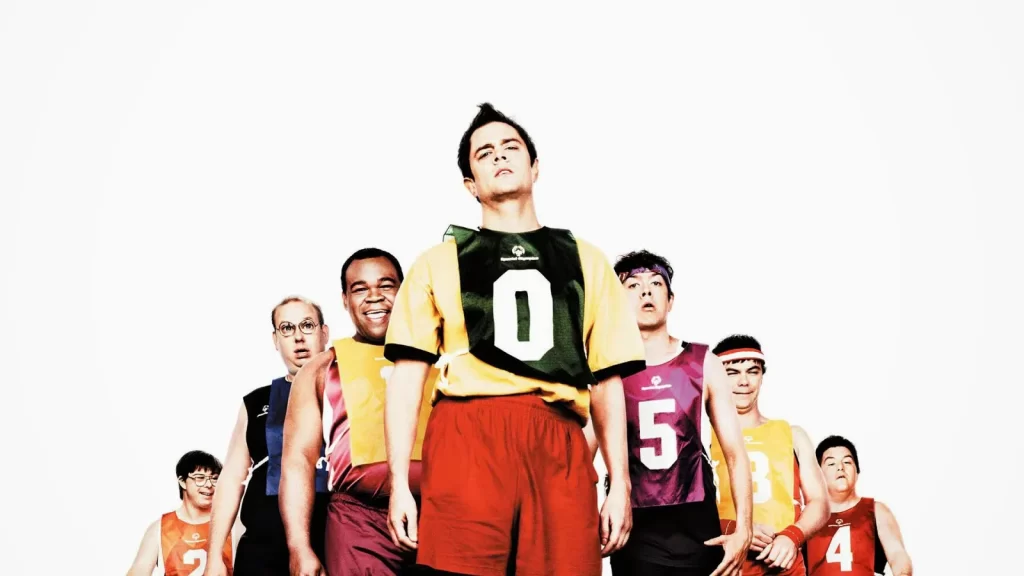Hey, out there in podcast land. Thank you for being here. This is our very first episode, our inaugural episode. Thanks for joining us.
On today’s episode, we’re talking about coach’s redemptions, misunderstandings, fish out of water. No, we’re not talking about Mighty Ducks! We’re talking about the movie Champions. It’s got Ernie Hudson, Woody Harrelson, Kaitlin Olson, and a whole cast of others. Let’s get into it. It’s Acting Up with AJ and Crew!
Transcript
Intro
AJ: Hey, out there in podcast land. Thank you for being here. This is our very first episode, our
inaugural episode. Thanks for joining us.
On today’s episode, we’re talking about coaches, redemptions, misunderstandings, fish out of
waters. No, we’re not talking about Mighty Ducks! We’re talking about the movie Champions.
[electronic, blippy music starts] It’s got Ernie Hudson, Woody Harrelson, Kaitlin Olson, and a
whole cast of others. Let’s get into it. It’s Acting Up with AJ and Crew! [upbeat theme music]
[clips from the movie play]
JULIO: These guys are capable of a lot more than you think. You’d be surprised.
BASKETBALL PLAYER: Don’t make me say it.
MARCUS: Make you say what?
AJ: If you’re gonna say it, say it.
MARCUS: That’s a boo-boo word.
[punch thrown]
BASKETBALL PLAYER: Ooh!
SHAWNSY: [laughs] Do us the big balls dance.
AJ: Dance on big balls!
COSENTINO: I have Down syndrome. I’m not Deaf! Got it, Slick?
SHAWNSY: These little nuances that just are annoying to people with disabilities.
MARCUS: What do I call them?
JUDGE: May I suggest you call them by their names? [music fades out, and movie clips end]
Unpacking Champions
SHAWNSY: Yeah. So, on this episode we wanna talk about, what we’re really gonna be talking
about is the public’s interaction and kind of education of dealing with disability, with workplace
abuse going on, public situations that were handled kind of poorly but brought up really, really
good points as well as personal interactions. And what I thought this movie did really well was
they brought up those issues but never lingered on them. They cut them off at the head
immediately, said that was the wrong thing, and then moved on. And it was like, yep, that’s how
it should be. This is how it’s going to be.
AJ: Yeah. And it was, to me, they were done in the way that they’re supposed to be done, like
done in very subtle ways that really fit into the story well. Because in some of these scenarios,
I’ve seen other scenarios where it’s really obvious that they’re making a point. And I really like
this because they, in my mind, they highlighted these issues, but it wasn’t like, it wasn’t like a big
red sign, like this is the point they were making. They didn’t beat anybody over the head with it.
SHAWNSY: Yeah, they really treated it like adults. They weren’t complaining about, “Oh, he said
this. They said that.” No, they were just saying, “I would like to be treated as an adult, and this is
how I run things. Deal with it.”
AJ: Yeah. And they were dealing with very adult issues, like all of them had a job, and, you
know, they had families and responsibilities and girlfriends and boyfriends and, you know, just
very, just very real, normalized.
SHAWNSY: Yeah, let’s dig into that. There was a montage in the movie where Cheech Marin’s
character was explaining to Woody about how they live outside of this Special, this Special
Olympics basketball team. They don’t just do Special Olympics basketball. One was working as
a veterinarian at an animal shelter. Another one was working in a restaurant just washing
dishes, but still like a 9-to-5 job or even a 10-12 hour-job.
AJ: Yeah.
[clip from the movie with upbeat music in the background]
JULIO: Like Benny, for instance. He lives on his own, and he wakes up at 5 AM every morning
and works in a restaurant in the kitchen. Now, Blair is not as self-sufficient. I mean, he lives in a
supervised group home with some of the other guys, and every morning he goes to a gardening
workshop. I mean, they all live pretty full lives. [clip ends]
SHAWNSY: Mm. A job can be anything, you know? And like, they’re just bringing up the point of
a fulfilling life, that you feel accomplished doing something. And most of these people were
happy in those jobs that they had found.
AJ: Yeah. Now, for some people, I’m not saying that this is bad, but for some people, they don’t
like exposition. And this part of the story, there was clear exposition. This is what it was. But I
thought, some of you might not agree out there, but I thought this was done very well. I liked
how it was, I liked how it was done.
SHAWNSY: Right. It was almost told to the audience not just to declare it and give these
characters backstory, but to tell an audience that thinks that people with disabilities don’t work,
don’t contribute, is saying that, no, they do a lot of things. They do a lot of fulfilling stuff.
AJ: Yeah, yeah. I mean, that’s what I really appreciated right away is like, no, these aren’t, you
know…. ‘Cause a lot of times people with disabilities are portrayed as like some, you know, and
we do need help, but just like a group of people that need help, that, you know, that rely on a lot
of people, take a lot of resources. But that scene showed that we, that they contribute to society,
and they work like me or you or Shawn or anybody, you know? People with disabilities, you
know, pay bills. They pay taxes as well. Surprise, surprise. But if you’re working, you’re paying.
SHAWNSY: Yeah, rent’s not free.
AJ: You’re paying taxes. Yeah. Yeah, you know?
SHAWNSY: No government handouts. [laughs] Yeah. Well, that sort of leads into as well on the
fact of workplace abuse. You know, in the discussion of Benny’s character, the dishwasher at
the restaurant, that he was clearly being abused by this restaurant owner and treated like a
lesser human.
[clip plays]
BOSS: What are you doing out here?! You’re supposed to stay in the kitchen! People might see
you. God, what’s wrong with you?!
BENNY: But my team won.
BOSS: Oh, really? They did? I don’t give a damn. Stop busting my balls with this basketball
nonsense, all right? I pay you to work, not run around in little shorts. Go! Go! Get to work.
Dribble the dishes. Try that. [clip ends]
AJ: Yeah, like, the boss was just, you know, very…. And it wasn’t just like you have to be here
and, you know, you can’t. You have to be here, and, you know, I need you here, and this is for
this. But he was very, like you said, abusive, and he was very, he was very disregarded towards
the character. And it was almost like, you know, it was almost like he had the stance of like, he
was probably mean and abusive because he probably had the mindset of like, you know, I hired
you. I’m giving you this job, so you should be grateful. That’s how some people might feel, you
know?
SHAWNSY: Yeah. Not only that, like, when they came in and busted his ass and played that
whole prank to get him to pay for those plane tickets, they clearly stepped on some sore notes.
He was clearly getting government handouts and probably getting tax write-offs and other
economic values for having a disabled person in his workforce. He was keeping his abuse on
the down low but was definitely benefiting from having Benny there.
AJ: I loved how… I loved how, you know, Benny was able to…. And I guess we should say, like,
some of this will be spoilery, I guess, if you didn’t see the film. But my favorite part as it relates
to Benny’s story is how he was able to, you know, he was able to get the courage to stand up to
his boss. He was, he lost his job, but he was able to stand up and say, like, I’m not gonna take
this. I don’t have to take this. My life is more than working for you. Yes, I need a job. But I also,
like, I love what I do, and I love this game, and I wanna celebrate and be with my friends and
team.
SHAWNSY: Yeah, that was kind of hard, you know? Like, when you’re standing, you really are
rooting for Benny in this movie. And then to just know it’s like, oh yeah, it was fine. I got fired.
And like, he writes it off, not thinking about it, but like, yeah, that’s definitely discrimination of just
being like, [chuckles] you’re not gonna work. You’re not gonna work at all. And maybe that’s for
all waiters and waitresses.
Other points that were kind of talked upon was certainly the bus situation when they’re riding on
the way in, people not knowing how to kind of cohabitate the same space as a person with a
disability or not recognizing when somebody is doing something.
AJ: Yeah. And, you know, I have noticed because I have been in groups where it’s like more
than one person with a disability, and people kind of look like, whoa! You know, what’s going
on? Or there may be a sense of uncomfortability, you know, like people are just uncomfortable
with disability or not knowing how to like, you know, how they feel about people with disabilities.
SHAWNSY: Yeah. And the way how they immediately turn to look for somebody that is the
parent, like, quote-unquote “parent” of the group. Are you responsible for these children? And
again, treating them not like the adults that they are.
AJ: Yeah. And again, because I just wanna emphasize this movie was about adults with
disabilities. I don’t, they might have been, like, in their late, some of them might’ve been in their
late teens. But would you say most of them were probably in their 20s or 30s?
SHAWNSY: Yeah. And I wouldn’t put a, I would say late 20s would be the youngest. Yeah, yeah.
And Consentino, being such a strong female character, also was great to be the one to deliver
that message when Sonny, the assistant coach, is walking up to her and just babying her for just
doing what, a basketball maneuver of just moving your feet side, shuffling side to side.
AJ: Like, he was, and I know he meant well, but it was like, “Good!” It was like, “Good job!” And
overemphasizing. And she was like, you know, “I have Down syndrome. I’m not a child.”
SHAWNSY: Yeah, that was like, what I think this movie did the best was the fact that it was just
bringing up these little nuances that just are annoying to people with disabilities. They don’t
wanna be treated like that. And like, this, these little moments didn’t have to be lingered on.
They were just brought up, they were corrected, and it was like, great, move on. Now we can
continue with our happy lives again.
[clip plays]
COACH: Move those feet! That’s what we’re gonna work on today. Good job! Good! Job!
COSENTINO: I have Down syndrome. I’m not Deaf. Got it, Slick?
COACH: Got it. Cool, cool. Yeah. I’m gonna be with the rest of the guys. [clip ends]
AJ: Yeah. There was…. Which I thought was funny, but then, so I’m not necessarily placing the
blame at the feet of this movie. But oftentimes in movies that feature characters with intellectual
disabilities, the R-word comes up or is used in. And a lot of times with people with intellectual
disabilities in movies, I’ve never seen it not come up, and so. And full disclosure, I was abused
with that said word, so maybe I have sensitivities to that word, but it often bothers me that
anytime there’s a context of somebody with a mental disability especially, that word comes up.
With that said, though, I thought that there was a funny part in the movie there on….
SHAWNSY: The basketball court.
AJ: Yeah. They can’t use their regular facility to practice. There’s something going on. So, their
coach, played by Woody Harrelson, takes them on a local court. And somebody’s, there’s
people are using the court. But what does he say? He says, “Got next” or?
[clip plays, with AJ and Shawnsy talking]
BENNY: We got next!
SHAWNSY: Yeah, but I’m bringing it round.
AJ: Yeah, yeah.
SHAWNSY: And then he’s just like, no, but come on.
BASKETBALL PLAYER: Come on, man.
SHAWNSY: Like, you’re gonna bring these people on to the courts? Like, no, we’re not gonna
have them play. Come on, be real. And it did, the movie did a really great job of bouncing
around it. But doing on that point of even though that guy did not say it, he was hinting at it
again and again and again.
BASKETBALL PLAYER: You know.
MARCUS: No, I don’t.
BASKETBALL PLAYER: Don’t make me say it.
MARCUS: Make you say what?
AJ: Yeah, yeah. And Woody Harrelson made him say it.
MARCUS: That’s a boo-boo word. [throws a punch] [clip ends]
AJ: You know, like, if you’re gonna say it, say it. And so, the guy said it, and he reaped what he
sowed [laughs]. ‘Cause, you know? And Woody Harrelson said, “That was a boo-boo word.”
In the scene early in the beginning of the movie, Woody is charged with drunk driving, and I
think, so he goes to court. This is how, this is why he’s in this scenario in the first place, is
because the judge gave him community service to coach this team of Special Olympic athletes.
And I think, was it his lawyer or something that said? ‘Cause he was like, he was caught off
guard, and he was about to say, are they, you know, he was gonna use the word. But I think his
lawyer said, “That’s a boo-boo word,” you know, so. And that was kind of done in a, everything
was kind of done in a comedic way, which I kind of, I appreciate ‘cause like I said, I’ve seen
other.
Now, with that said, I’m not criticizing this movie, so we’ll start with that. But I would like to, I
would like, in the movies in the future, I would like to see that every time there’s somebody with
a disability or intellectual disability that we don’t have to use that word. In my opinion, and it
might just be my opinion because again, I know I have sensitivities to the word, but I don’t think
we need to bring that, continue to bring that point of like, this is a bad word. I think we’re, in my
opinion, we’re over that, so.
SHAWNSY: Cheech Marin said it really well when Woody was, “Well, what do I call him?” And
he goes to him, and he’s like, “You call them by their name.” Like, there’s no, no other way
around it. Like, I was, that’s as easy as it gets. And the movie also did really well with kind of
showing the characteristics of each of these disabilities on, like, how people with Down
syndrome operate, and how they feel happy, how other brain traumas, how that might change
somebody’s body, and accepting them for who they are.
AJ: Yeah.
SHAWNSY: And all the quirks included. ‘Cause all, every, every human being has quirks, and
we should be accepting of those quirks. Like, that’s what makes your personality who you are.
[ambient music break]
News Feed
AJ: Here’s Cheryl Green with News Feed. Cheryl, I’m having a hard time wrapping my head
around exactly what’s going on with the Census.
[bright news theme music plays]
CHERYL: Okay, here’s one from early December 2023, and I think this one’s really interesting.
You can find it on the AP news website. And the title is The Census Bureau Wants to Change
How It Asks About Disabilities: Some advocates don’t like it. This is by Mike Schneider. Here’s
the story.
The U.S. Census Bureau wants to change how it asks people about disabilities, and some
advocates are complaining that they were not consulted enough on what amounts to a major
overhaul in how disabilities would be defined by the federal government.
Disability advocates say the change would artificially reduce their numbers by almost half. At
stake are not only whether people with disabilities get vital resources for housing, schools or
program benefits but whether people with disabilities are counted accurately in the first place,
experts said.
Some also question the timing of the change, which comes just as more people are living with
new, long-term conditions from the COVID-19 pandemic.
Census Bureau officials say the proposed change on its most comprehensive survey of
American life will align the U.S. with international standards, allowing comparisons among
countries. They also say it will better capture how disabilities occur in the real world, since they
rarely fit neatly into stark yes-or-no boxes that don’t account for variations or nuance.
The bureau has spent time, money and energy trying to improve counts of racial and ethnic
minorities who have been historically undercounted, but the statistical agency seems willing to
adapt questions that will shortchange the numbers of people with disabilities, said Scott Landes,
an associate professor of sociology at Syracuse University.
“This, in my mind, is illogical,” Landes, who is visually impaired, said in an interview. “There is a
piece of me that thinks, ‘How dare you — to think that we don’t count.’ I get offended.”
If given final approval, the changes to the American Community Survey questions would be
implemented in 2025. The ACS is the most comprehensive survey of American life, covering
commuting times, internet access, family life, income, education levels, disabilities and military
service, among other topics. The statistical agency was asked to make the change by the
National Center for Health Statistics and is accepting public comment on the proposal through
Dec. 19.
The existing questions ask respondents to answer “yes” or “no” if they have difficulty or “serious
difficulty” seeing, even with glasses, or are blind; hearing, or are deaf; concentrating,
remembering or making decisions because of a physical, mental or emotional condition; walking
or climbing stairs; dressing or bathing; or performing everyday tasks because of a physical,
mental or emotional condition. If the answer is ”yes,” they are counted as having a disability.
Under the proposed change, respondents would be allowed to answer most of the same
questions with four choices: “no difficulty,” “some difficulty,” “a lot of difficulty” and “cannot do at
all.” There are tweaks to the language of the questions, and the proposal adds a query on
whether respondents have trouble communicating.
But the most significant change involves the threshold beyond which people are determined to
have a disability. The international standards being considered by the Census Bureau typically
define a person as having a disability if they answer “cannot do at all” or “a lot of difficulty” for
any task or function.
During testing last year by the Census Bureau, the percentage of respondents who were
defined as having a disability went from 13.9% using the current questions to 8.1% under the
international standards. When the definition was expanded to also include “some difficulty,” it
grew to 31.7%.
Marlene Sallo said her degenerative spine condition presents difficulties on some days, but
overall she is able to function on a daily basis, so she worries that she might not be considered
as having a disability with the revised questions.
“Right now, it’s not inclusive and it will miss many individuals within my community,” Sallo,
executive director of the National Disability Rights Network, said last month at a meeting of a
Census Bureau advisory committee, of which she is a member.
Officials at the Census Bureau and the health statistics agency argue that the change will give
officials better information and details about disabilities that can inform how services or
resources are provided. Census Bureau officials had two conference calls with disability
advocates on the subject this week.
“Forcing a dichotomy masks nuance,” Julie Weeks, an official at the National Center for Health
Statistics, said during a presentation last month.
The terminology surrounding disabilities has evolved in recent years, moving away from labels
that imply inferiority and toward more sensitive language that outlines the specific conditions or
circumstances in which individuals or groups live. The Associated Press defers whenever
possible to the wishes of people or groups in how they choose to be described but uses neutral
language that withholds judgment about a person’s condition.
Disability advocates said the international standards were formulated without their input. Last
month, the Census Bureau’s National Advisory Committee recommended that the statistical
agency not adopt the change until it meets further with disability advocates and researchers.
While the proposal may be better for scientific research, the questions, if approved, will be
adapted with the needs of agencies and not people with disabilities in mind, Andrew Houtenville,
research director at the Institute on Disability at the University of New Hampshire, told members
of the National Advisory Committee at last month’s meeting.
“This has taken a lot of people by surprise,” Houtenville said.
Some experts believe the current questions don’t adequately account for people with mental
health problems, developmental disabilities or chronic health conditions, like those faced by
many people living with long COVID. But they say the proposed change isn’t the answer.
“Disability is an evolving concept, and there is a new kind of disability we didn’t have five years
ago, Long COVID, and we need to be able to account for that and other changes,” said Susan
Popkin, co-director of the Disability Equity Policy Initiative at the Urban Institute, who has a
chronic autoimmune condition.
The proposed change is grating to some advocates since it is occurring at a time when disability
has grown to be an identity and a social movement, rather than just a function-based definition
of someone’s limitations. For instance, a person with limited hearing may be able to function
fully with the help of hearing aids but can still identify as having a disability.
“You can be proud of your disability and still not want the pain and symptoms of the conditions
that lead to that disability. That is part of a shift in disability as a demographic group,” said
Bonnielin Swenor, director of the Johns Hopkins Disability Health Research Center, who has low
vision.
“There is a shift of view in disability pride and claiming disability identity as part of who we are …
not as a deficit,” Swenor said. [news music fades out]
I know as News Wizard I’m just supposed to read the stories. But I will say as Voice of Reason
that I appreciate the way this journalist spoke to people with disabilities and identified their
relationship to their disabilities, given that the point of this story was to say that the Census
Bureau is changing these questions without having talked to the people who it’s going to affect
the most. Here’s hoping that they put this one on ice for a minute and have some more dialogue
with the community.
AJ: You’re listening to Acting Up With AJ and Crew. Thank you so much for being a part of the
crew. You can follow us on all social media platforms, and you can like and subscribe wherever
you get your podcasts. Now back to the show!
Champions and family
AJ: Yeah, yeah. And so, we were just kind of talking about as we were watching the film, how
authentic it was to a lot of, and it brought a lot of aspects to, that we deal with in the disability
community from, like we said, from employment to caretaking to family dynamics to, which leads
us to there was another character in the movie who played a sister to was it Johnny’s
character?
SHAWNSY: Mmhmm.
AJ: And we were talking about it, and we were just kind of saying how it, you know, because
there’s a scene in the movie where I think Woody Harrelson wants her to be involved on some
Saturdays.
SHAWNSY: Wants her to drive the bus.
AJ: Yeah.
SHAWNSY: Wants her to drive the team halfway across the state to go to these games.
[clip plays]
COACH: You? You strike me as someone whose weekends are free.
ALEX: [mocking laugh] Good one.
JOHNNY: Alex doesn’t work on Saturdays!
COACH: Doesn’t work on Saturdays? Well, and you have this tremendous chariot at your
disposal! [clip ends]
AJ: And she brings up the point of, you know, she just brings up the point of saying how packed
her schedule is, and you just can’t, you just don’t realize, you know, everything that I have to do.
[clip plays]
ALEX: Let me break this down for you, Coach. I’m a woman in my 40s. I don’t have time for
bullshit, all right? Do you know what I do during the weekday?
COACH: No.
ALEX: I perform Shakespeare for middle school kids right after lunch. Do you know what middle
school kids wanna be doing right after lunch?
COACH: No.
ALEX: It ain’t Shakespeare. It’s exhausting, but it’s acting. And I love acting. So, after that, I go
home, and I do a lot of freelance bookkeeping because Shakespeare—and brace yourself here,
this might blow your mind—doesn’t pay so much.
COACH: [chuckles]
ALEX: And then I go pick up Johnny from work, and we spend the whole afternoon together.
And I love him very much, but it’s exhausting! And then I make dinner with my mom, and then I
watch Doctor Who with Johnny, and if I have any energy left at the end of the night, sometimes I
hop on Tinder. [clip ends]
SHAWNSY: Yeah. She brought it very succinctly to him on the fact that somebody out there
trying to solve a problem can easily go to, oh, why don’t you just ask your sister to do it for you?
Or why don’t you go ask your mother that does it for you all the time? And not realizing the
amount of time that it takes, or the amount of time that has already been spent with your
disabled relative, and that sometimes you need to have breaks. And these Saturdays, she
brought it up very succinctly, like, those free times are the times that she cherishes very dearly,
and that it’s not a small order to just be like, oh yeah, willy-nilly. I’m gonna just fill my time up
with this. It’s something that is very much she’s devoting her life to her brother.
AJ: And she loves her brother. It’s not about not loving her brother. And I brought up to you that
this is something that happens to me a lot, like, you know. And people, friends and associates
that are well-meaning, they mean well, but oftentimes, they’re like, they bring up things that I
can be a part of or do or that I should do and look into. And they’re like, “Well, ask your mom.”
And I’m like, well, you know, “I know you might be busy, but can you help me?” Because my
mom, you know, my mom is my main caretaker. She is my PCA, which some of you may know.
My mom is my personal care assistant and a mom, so she works a lot with me. And so, I think
people are, you know, well-meaning. They don’t mean to not realize. But I think people are just
used to, like, they see that my mom does a lot of different things for me, but they don’t take into
account how much that is, though, you know? And so, it’s very frustrating for me and my mom.
My mom, she is my main caretaker. I don’t really have any other caretakers. And, you know, so,
a lot of times things that I’m gonna do does fall on her. So, you know, and that happens to a lot
of, happens to a lot of caretakers.
SHAWNSY: Mmhmm. That’s why it was also really great that the movie highlighted on the idea,
the group home for those kids where a lot of people with disability go. And they’re hanging out,
and they live full-time with their friends. They go off to work, they come back home, and there
are caretakers that are there in those group homes. It wasn’t brought up, but it is just shedding a
light that there is a way for people with disability, cognitive or otherwise, to live full lives and be
separated from their families, be able to be away, have a parent be able to get some breaks
here and there. Like, these are options. They exist.
AJ: And there was a point in the movie where the sister was, I wanna remember, I can’t
remember her character’s name. Do you?
SHAWNSY: Kaitlin Olson’s character of Alex.
AJ: Okay. So, the character of Alex was, okay, so the character of Benny really, you know—
SHAWNSY: Of Johnny.
AJ: Johnny. Excuse me. Johnny really was excited about this prospect of moving in with his
buddies, having his own place, and being roommates with his friends. And he was excited. He
was like, we’re gonna be the three amigos. And he was excited about that prospect. But he
knew that his sister was very hesitant about…. She didn’t want him to be in that, be in a group
home at all because she was like, you know, he has care here. And I thought to myself, those
things come up because she was probably very concerned about his level of care.
And also, I just thought about this. Maybe to her, to her maybe in a way, in her mind, a group
home may mean that—which is not true at all—but to her it may mean that like, you know, I
don’t love my brother, or he’s not gonna get the right type of care that he needs, or we’re giving
up on him or might be concerned about his safety. Which, you know, those things are real. I
don’t wanna, I don’t wanna… I don’t wanna trivialize those fears and concerns because I have,
I’ve been in some scenarios where I stayed in some group homes, and those weren’t the right
scenarios for me. And I was in a bad way, and I had to be taken out of those situations. So, that
can happen. But in this case, in this case, I think it was more fearful. And I think it’s also about
growth, you know? If you’re used to doing so many things, if you’re used to doing a thing for so
many years where you’re completely dedicated, mind, body, and soul to caring for a loved one,
and then to all of a sudden for that not to be the case, even though it’s a good thing ‘cause it
shows growth and he’s being an adult and can be in his own way, that can be jarring, you know?
It’s not gonna be easy.
And also, it showed that just because a person, from Johnny’s perspective, I mean, he was very
aware that, you know, of the dynamics of his mom and sister. Like, he knew that there wasn’t a
father in the home, and he knew that the father left because of him. He also knew that his sister
loved him very much, and because his father walked out on them, as a, I feel like as a brother
and as a man, even though he’s disabled, he felt like he didn’t wanna do that to his mom and
sister. So, he had the awareness of knowing about this pain, and he didn’t wanna do the same
pain, you know? So, I like that too, because that showed you may have a disability, that does
not mean that you’re not aware, you know, and that you don’t care for others. Whether it’s the
right way or the wrong way of looking at things, we all care for each other. And I like that in a
way, because it showed that whether it was unhealthy or not, his sister cared for him, and he
cared for his sister and his mom, you know.
Content Roundup
[chill music]
AJ: This is Content Roundup. This is a segment where we’re gonna talk about movies,
streaming, and television. And we’re also gonna maybe talk about some books every now and
again and some gaming as well and a whole lot more. Here we go with our very first Content
Roundup.
Okay, guys, we’re gonna start off with the spin-off of Hawkeye, the long-awaited series of Echo.
Now, Echo is gonna take place right after the events of Hawkeye. The character of Maya Lopez
is being pursued by the Wilson Fisk organization. She has to move back home to Oklahoma
and reconnect with her Native American roots. Not only is the character of Maya Lopez Native
American, she’s also Deaf and an amputee. You can catch all five episodes streaming on
Disney+ and Hulu starting January 10th. Closed captioning and audio description are available.
Now, I say that with a caveat, because we know for sure that both closed captioning and audio
description will be available on the Disney+ platform. I can’t say for sure on Hulu because when
it comes to audio description, it can be a little bit iffy and spotty on Hulu. However, Disney did
just purchase Hulu in full, so audio description may be available.
Now, this next one may be filed under the label of “very obvious,” but did you know on Netflix, if
you type in “disability” on your search, oh whole library of disability content, films, and specials
will come up?! Just type in the word “disability” on your Netflix streaming platform. This has
been a Content Roundup. [chill music fades]
Champions at the box office and lack of promotion
DONOVAN: Hey Uncle AJ, I’m Donovan.
DALLAS: And I’m Dallas!
DONOVAN: And welcome back to Acting Up With AJ and Crew…
DALLAS: Podcast!
AJ: Yeah. So, we are back, and now we’re gonna talk about the box office of Champions. So,
this movie came out in March. Do you, can we pull up?
SHAWNSY: Champions was released March 10th of 2023.
AJ: And so, it had a theatrical run.
SHAWNSY: About 3,000 theaters. Champions was based off another film called Campeones, a
Spanish film done in 2018, so even actually pretty recently, only five years apart from them.
Campeones won a bunch of nominations as well as winning a bunch of those nominations
throughout the years. But it also kind of had a similar box office of only $23.3 million.
AJ: I just, I think about the thing that stands out to me is a couple different things. I think
because of the way that the box office is today, most of the movies that are gonna make a lot of
money in today’s box office are big tempo movies, or big movies that have, like, or movies that
have built in IP. That’s, I like to do this for people that may not know, intellectual property. A lot of
people use acronyms, and I’m like, what is that? So, I like to say intellectual property or big
things like DC or Marvel or, you know, or the big things that may have reboots, different things
like that.
And, but also, this is the thing that stands out in my mind about Champions is I remember when
you were telling me about this movie, Shawn, and this movie was coming out in March. And I
think I found out, like, I think I literally found out a couple weeks before it was coming out. But I
didn’t see, I didn’t see any promo for it. You told me about it, and I looked it up with a friend of
mine. And we actually did a video. We did a review of the trailer for another channel that I work
for. And then when I did see promotion for it, it was when it was actually already out. And one of
the things I was talking about and that I think about is that with a lot of films with disabilities, and
I’m very proud and excited that it’s out. Like I said, I think it’s worth it to check out. It’s very
funny, very good, strong ensemble. But, you know, the thing that I get sad about is I know a lot
of people may not have even heard. Perhaps if you’re listening right now, you may have not
even heard of the movie Champions, because a lot of times movies like this did not get the
budget that it needs for promotion.
SHAWNSY: Right, right.
AJ: And so, I was sad about this right away because I knew about it, like, I think you told me
about it. And it was March. I think it was like maybe a week or two from coming out.
SHAWNSY: Yeah, I think I saw it in mid-February, when I like just. And I just stumbled on it on
YouTube. But also, we just have a community that are very vocal with each other in letting each
other know about news. And so, like, a group had found out about it, but really it was word of
mouth.
AJ: Yeah, it was word of mouth. And that’s, we’re still at that, we’re still, we’re still at that point
when it comes to, I know in a large sense, people may say that’s independent film in the first
place. But this, we’re still at that point with disability. This was distributed by a big distributor,
Universal and Focus Film. They are not independent distributors by any stretch of the
imagination. But it’s just like I was very afraid and very sad because I knew already that this
movie probably wasn’t gonna get a lot of traction. As soon as you told me about it, Shawn, I
tried to find. Now, in the coming weeks, as the movie was coming out, there was more
promotion, so I did see it. But when I, when you told me about this, I tried to look up different
interviews with Woody Harrelson, maybe some press junkets, and I did a search, and I couldn’t
find any press junkets or anything. And I think there was a major push maybe on The Today
Show when it was coming out.
SHAWNSY: Well, what also came out in March of 2023, you were looking at Creed 3, you were
looking at John Wick 4, Scream 6, you got the newest Shazam! movie that just came out this
year, and you got Dungeons & Dragons, all of which have faces to them. And like we were
discussing on Woody Harrelson not necessarily being a sellable place, but like, really, it was the
disabled community trying to push this as much as possible with no help from the actual
distributing company.
AJ: And I just wanna say like, I just, this is just my honest, bare bones opinions. I wish, and, you
know, I’m not involved in the company, so I just wanna say there are a lot of factors that maybe
I’m not aware of. But I just wanna say that I wish that it had more promotion, but I do wanna
thank Universal and Focus Film because they did give this movie a theatrical release.
SHAWNSY: I saw it in theaters.
AJ: Theatrical releases still matter. And a lot of times—it would be interesting to track later.
Maybe we could do an update later on the tracking to see if it does better on VOD or not—
because a lot of times, a lot of times, if the movie is in the, if the movie has a theatrical run, it
does better on VOD. So, I do wanna, I do wanna give props to Universal and Focus Features
for giving it a theatrical release because especially with a movie like this, more of an
independent vibe to it, like a smaller movie, they could’ve just stuck it on VOD and streaming.
But they did not, so I’m grateful for that. Thank you. However, I would say give it, it could’ve
been given more of a promotional budget.
SHAWNSY: I know. If Mighty Ducks can make $50 million on its box office run, I think
Champions can do the same.
AJ: Yeah. I think like, if, especially, you know, and I’m gonna say something, and not that I
speak ‘cause I don’t. I don’t speak for the entire disability community. That is something that I
would never try and do. But I think as a person in this community, we’re so excited and we so
crave and we like good entertainment and we wanna see our community on that screen and our
stories reflected. I think if more and more, if we knew about it, you know, I think we would’ve had
a higher box office. I really think we would have, because, like I said, we are a minority that’s not
seen on screen a lot. So, when we are, we really wanna celebrate that. And I think we would’ve
had a larger audience if it was promoted well.
A lot of times with disability, whether it’s a film or a book or anything about disability, right now,
you know, it’s a lot of disability things are word of mouth. A lot of us that are in the disability
bubble, like, we tell each other. But a lot of times—and that’s great because we wanna celebrate
things and get our story out there—but a lot of times it’s ourselves talking to ourselves, you
know? And we wanna get great movies out there with great content and really well-told stories.
We wanna get that out there to the movie audience, because there’s a lot of people out there
that enjoy great comedy and great movies with well-told stories. There’s a lot of cinephiles out
there that would’ve loved this film. It’s a great film. It’s a great popcorn movie, too. You just
wanna go chill out, laugh, have a good time, and enjoy a great soundtrack too, check out
Champions. And so, the other point I wanna make is like, this is not just, this is not about at all the right thing
to do or to feel good. You know, and I don’t wanna talk about anybody. I don’t wanna put any
words in anybody’s mouth. But it’s not about like, Universal and NBC and Peacock and
everybody, they might have felt good, and they should feel good to a certain extent. They did
put this movie out and it’s a good movie. It has a great cast. Shoutout to the casting. I really
enjoyed the script. But it’s not a thing of like, we’re doing this to feel good or it’s the right thing
or. This is a business, so treat it as a business and treat it as like, this is the audience that is
way underserved. And if we promote this right, we can show good entertainment and show that
we’re on the right side of doing this right, and we can make a buck, you know? And you can, but
people have to know. People have to know that it’s out there. People have to know.
[funk music break]
Disability Spotlight
And now, here’s Shawnsy with Disability Spotlight. Shawnsy?
SHAWNSY: Thanks, AJ. [chill music]
Welcome to Disability Spotlight, where we highlight the many talents within the disabled
community. This episode’s spotlight goes to the multifaceted, multicultural ensemble cast for
none other than this episode’s topic of conversation, Champions. This cast represents the many
shades of disability from autism, traumatic brain injury, Down syndrome, and so on. Now there
are ten to this group, so I’m going to go a little quicker than normally would when it’s just one or
two people. But all of them are very deserving of all of this recognition.
To start off, we’re gonna start with the only female on the team, the strong spitfire of Madison
Tevlin, playing the role of Consentino. Her previous work includes a few episodes on a comedy
sitcom known as Mr. D, as well as a few episodes on Lost & Found Music Studios. She has two
upcoming projects in the works for 2024, with a voice acting role within the movie The
Adventures of Tiki the Wonder Dog, as well as a film that is in currently in post-production at the
moment, a coming-of-age-story comedy called Screams From the Tower. Moving on, Joshua
Felder, playing the role of Darius, is a global ambassador and International Board of Directors
member for the Best Buddies International, as well as the accolades of being the first-ever
disabled dancer at the Super Bowl, where he danced with The Weeknd. Next up, Matthew Von
Der Ahe, playing the role as Craig, started his acting career at age seven, was gotten a role at
the age of nine on Yo Gabba Gabba! as well has done a few episodes in the shows Code Black
and Weeds. Next, Kevin Iannucci, playing the role as Johnny, has done two other films,
Embattled in 2020, as well as The Best of Enemies in 2019. Moving on, Casey Metcalfe, playing
the role of Marlon, was a part of the New England Youth Theatre, where he did many stage
plays, including a character study of Shakespearean literature’s King Lear with the Young
Shakespeare Players. He has also been a star on the award-winning documentary Kids With
Cameras that released in 2009.
Beyond this, five of the other members of the Friends basketball team were first time roles.
Auditioning alongside hundreds of other actors, these five were given their first shot at a big
screen debut. Congratulations to Ashton Gunning playing Cody, James Day Keith playing
Benny, Alex Hintz playing Arthur, Bradley Edens playing Showtime, and Tom Sinclair playing
Blair. Congratulations to the amazing ensemble, to the movie, Champions. The Friends
basketball team is a shining beacon for diversity within the film industry.
To end this spotlight, a quote from Metcalf himself, “the more people we have in this industry
who are diverse, not just racially diverse, but also neurodiverse, I think that’s exactly what the
industry needs.” I couldn’t agree more with you, Casey. As I see, with 20% of our population
being disabled, to not include 20% of those in our characters and roles is a shame. As with
diversity like this, it only brightens the colors of the rainbow. This has been Disability Spotlight.
Shawnsy out. [chill music ends]
Wrap-up
[epic theme music]
AJ: Acting Up With AJ and Crew is produced by Shawnsy Billops, segment producer Cheryl Green,
and yours truly, your boy Ajani AJ Murray. Special thanks to Jessica Marks for behind-
the-scenes assistance. Champions is available on Amazon Video right now. Closed captioning
and audio description are available for your access needs.
Transcript provided by Cheryl Green.
